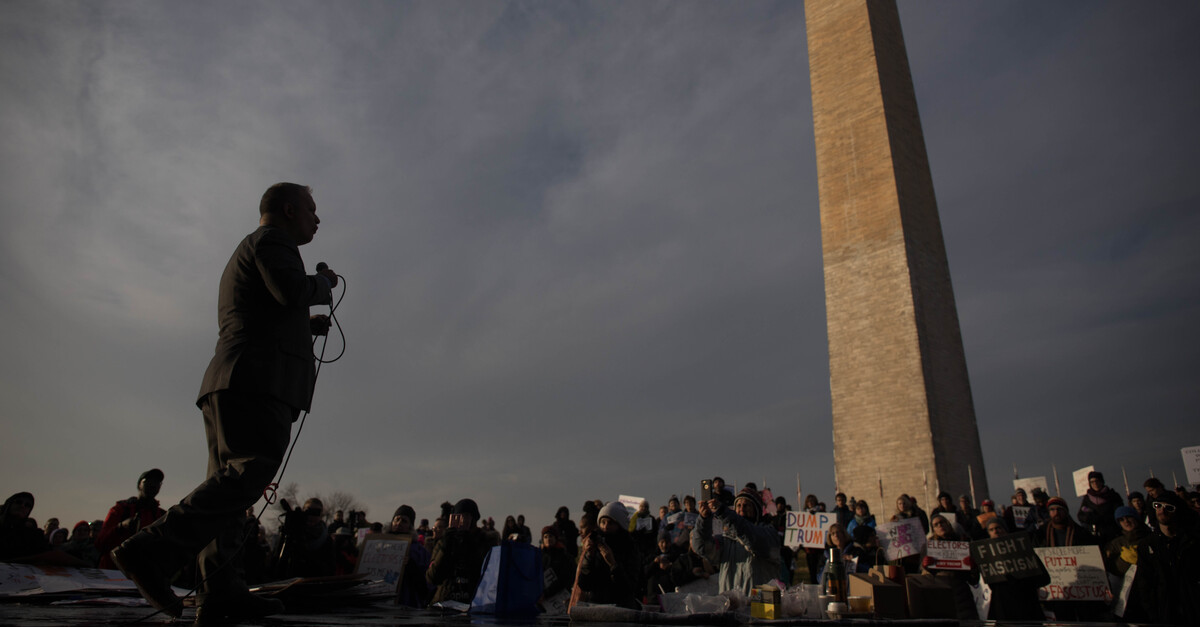
Christopher Suprun, a Texas GOP “faithless elector” who will not cast a vote for US-President Elect Donald Trump, speaks during a demonstration hosted by #TURNOUT at the Sylvan Theatre near The Washington Monument in Washington, DC, December 17, 2016.
The U.S. Supreme Court is set to hear a case about electoral adultery.
So-called “faithless electors” are members of the Electoral College who defy their state’s voters and cast their ballots for someone other than the presidential candidate who won the most votes in any given states.
Over the course of the nation’s history, a total of 167 electors have voted faithlessly. In 2016, seven electors cast faithless votes. Hillary Clinton lost five votes otherwise understood to have been intended for her; then-president-elect Donald Trump lost two from his total.
Micheal Baca was originally one of those renegades. Selected to join Colorado’s Electoral College slate, Baca was expected to vote for Clinton. Instead, he cast a ballot for then-Ohio governor John Kasich as part of a plan to deny Trump an electoral college victory and instead throw the presidential election to the U.S. Congress. After that, Colorado’s secretary of state removed Baca from his position–citing an arguably unconstitutional state law. Baca sued.
“The Constitution gives Colorado no power to restrict the legal freedom of federal Electors to vote as they deem fit,” Baca’s complaint reads. “The actions of Colorado’s Secretary of State to enforce that unconstitutional law thus violated Plaintiffs’ federally protected rights.”
The 10th Circuit Court of Appeals agreed with Baca.
A massive 125-page decision vindicated the activist’s right to vote against the state’s popular will in accord with the system set up by the country’s Founding Fathers–Alexander Hamilton had expressly outlined the right claimed by Baca and others in one of the Federalist Papers.
That controversial decision noted:
As [case law and history] reflect[s], the definitions of elector, vote, and ballot have a common theme: they all imply the right to make a choice or voice an individual opinion. We therefore agree with Mr. Baca that the use of these terms supports a determination that the electors, once appointed, are free to vote as they choose.
“Indeed, we are aware of no instance in which Congress has failed to count an anomalous vote, or in which a state—before Colorado—has attempted to remove an elector in the process of voting, or to nullify a faithless vote,” the decision continues. “And on only one occasion has Congress even debated whether an anomalous vote should be counted.”
Colorado Secretary of State Jena Griswold blasted the decision.
“This court decision takes power from Colorado voters and sets a dangerous precedent,” Griswold said in a brief press release after the court ruled against her. “Our nation stands on the principle of one person, one vote. We are reviewing this decision with our attorneys, and will vigorously protect Colorado voters.”
Griswold subsequently appealed to the nation’s high court–which on Friday agreed to hear the case and another similar controversy originating out of Washington State.
Both sides of the debate welcomed the news.
“Unelected and unaccountable presidential electors should not be allowed to decide the presidential election without regard to the voters’ choices and state law,” Griswold told the Los Angeles Times. “We hope the U.S. Supreme Court will protect the rights of the states to enforce their law and defend the rights of Americans to choose the U.S. president.”
Harvard Law Professor Lawrence Lessig, who has represented the dissident electors before lower courts, expressed a perspective focused on the bureaucratic niceties of efficiently administering the state.
“We are glad the Supreme Court has recognized the paramount importance of clearly determining the rules of the road for presidential electors for the upcoming election and all future elections,” he said.
[image via Zach Gibson/AFP/Getty Images]
Have a tip we should know? [email protected]